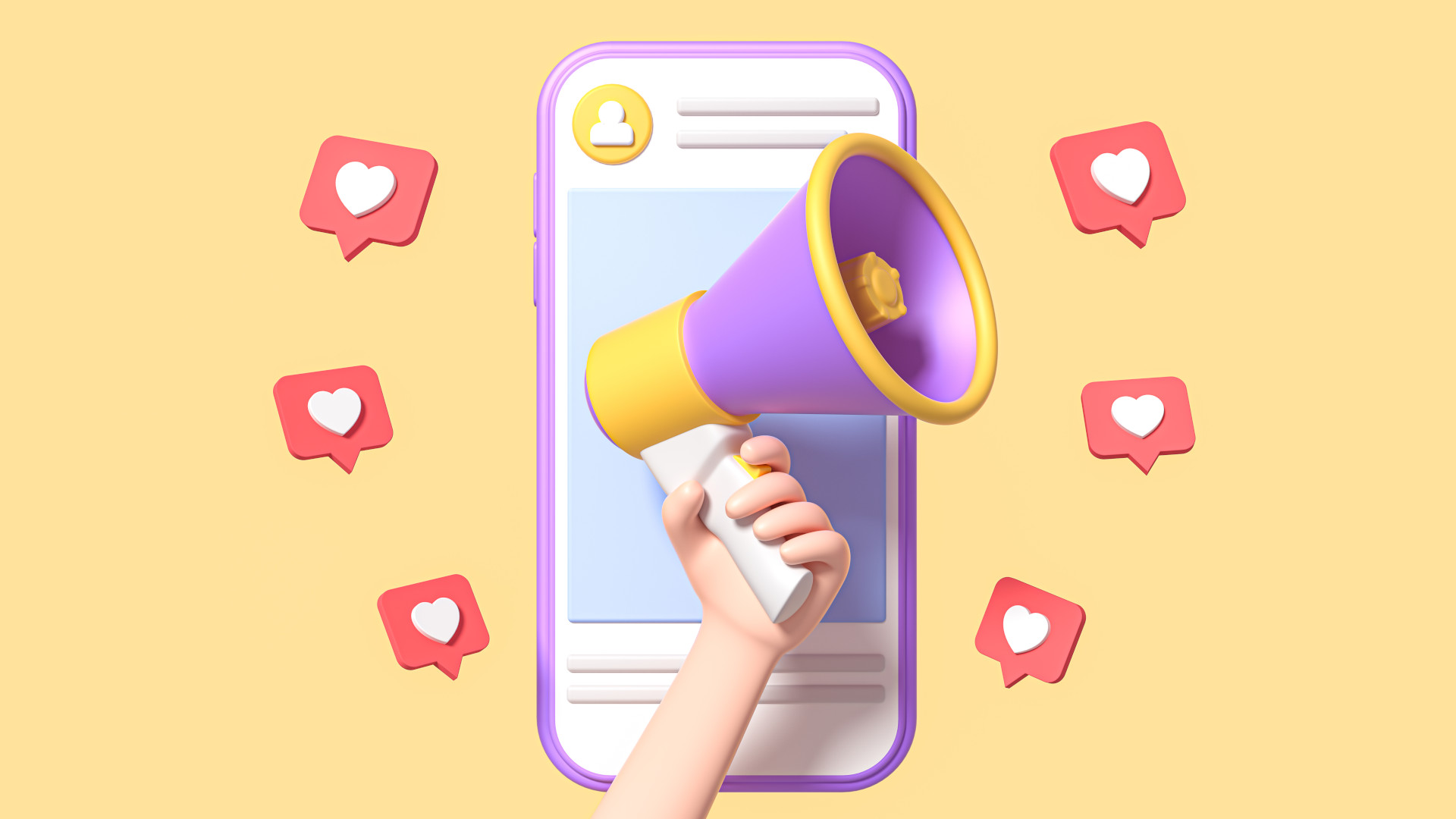
The tides may be turning on how young people view social media. YouGov’s most recent bi-annual survey of social media’s mental health impact in the US shows 18-29-year-olds in the US feel like it’s a net positive for their mental health - but why when this feels so very counterintuitive to everything we’ve collectively seen so far?
This particular demographic is largely made up of digital natives; Gen Zs and late Millennials (or Zillenials, as I self-identify). Yet, if you ask most people how they feel social media impacts their mental health, a majority will probably have a negative association. It’s inherently addictive, can affect our body image, and exposes us to all kinds of toxic and negative opinions that can lead to feelings of isolation, depression, and anxiety.
Statistics have generally supported this idea, including YouGov’s US survey as well as its UK respondents (and even Facebook itself). Overall, 31% and 33% respectively agreed social media has a negative impact, versus 19% and 13% expressing a positive impact.
Broadly speaking, Gen Zs are an age group that hasn’t known life without social media - but it’s not just them who apparently feel the benefits. YouGov’s results show that even 30-44-year-olds can’t quite make up their mind in recent years. Is it that young people simply don’t know any different, or are we finding new ways to adapt?
According to YouGov’s most recent survey, 40% of respondents between the ages of 18 and 29 in the US expressed that social media brings more of a positive impact versus the 27% who feel it does not - a fairly steep shift from results from last June, which saw 28% respond positively and 33% negatively.
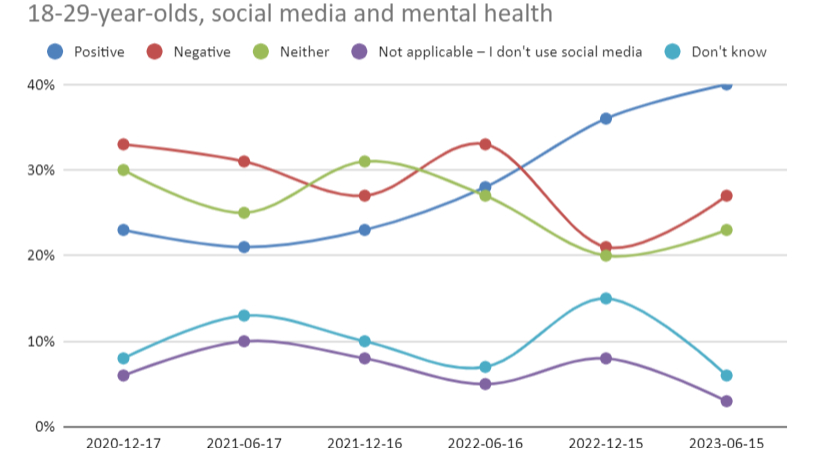
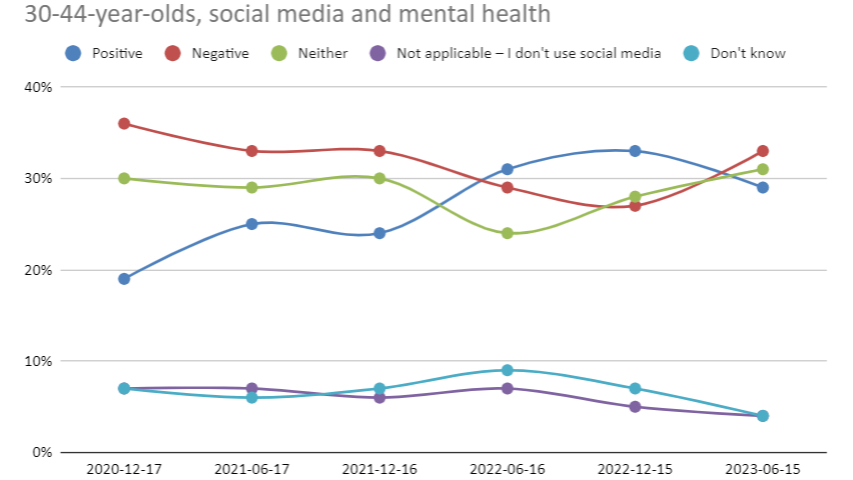
In 30-44-year-olds, results are becoming increasingly muddied; most recently, 29% felt social media had a positive impact while 33% disagreed, versus December’s results which saw 33% find it positive versus 27% negative. Broadly speaking, these respondents are millennials, the last generation to have experienced their youth both with and without social media’s iron-fisted grip.
YouGov’s US data doesn’t go as far back as the beginning of the pandemic in the US, but from the end of 2020 until now there’s been a fairly clear correlation; young people are increasingly perceiving the benefits of social media.
Supporting this, three other YouGov surveys in 2021, 2022, and 2023 asked respondents if they felt social media had a positive impact on society, and progressively, people are more inclined to say it has - with a more drastic shift in opinion seeming to have occurred in just the space of the last few months.
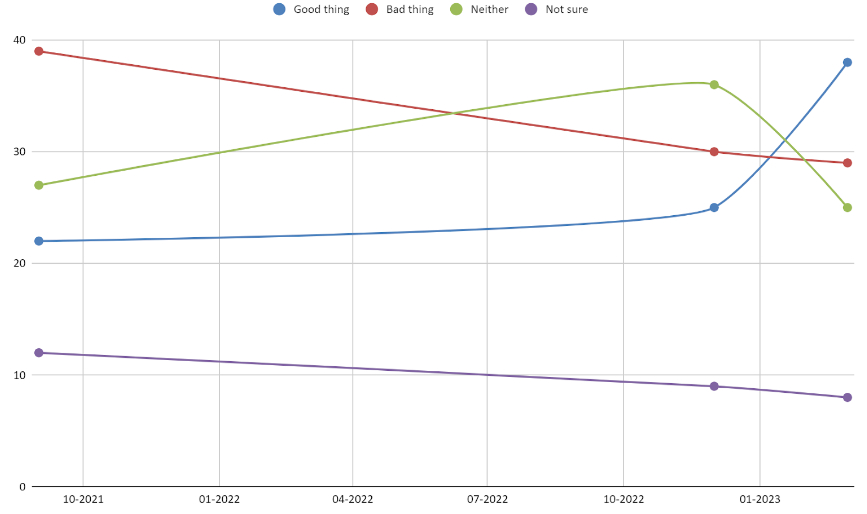
Granted, it’s been a fairly turbulent time online. From Elon Musk’s Twitter shenanigans to wide-scale service outages, influencer cancellations, and the seemingly unending popularity of TikTok, we’re chartering unknown waters online.
Masochism or malleability
To help understand these results, I asked some US friends and colleagues between the ages of 18-29 about their thoughts on social media and mental health, and while the majority disagreed with the survey results, the margin was still smaller than I expected; 37.5% still felt social media was broadly positive versus the rest who disagreed.
I asked all of the respondents to tell me what they felt about social media being positive for their mental health, and many mentioned some of the more obvious benefits; staying connected to family and friends, and keeping entertained and informed on current events.
Others mentioned finding inspiration for creative interests on platforms like Pinterest and TikTok and accessing resources for mental health - and a couple specifically highlighted newer “de-influencer” movements that create mindfulness and wellness content.
On the other hand, trolls, overstimulation, and unrealistic standards for body image and lifestyle were among the most regularly mentioned negative aspects. One respondent highlighted Twitter, especially in its post-Elon Musk era, as a particularly negative site thanks to its low moderation standards and algorithmic changes, and others felt an influx of negative or insincere content detracted from their mental health.
Emily Hemendinger, Assistant Professor, Clinical Director, and DBS Coordinator with the OCD Program at the University of Colorado has particularly focused on the relationship between social media and body image, and while she recognizes the positive effects of keeping connected and driving social change, she notes that social media “comes with the baggage of being a driver of hate, harassment, misinformation, and unrealistic standards for body image, self-worth, and life in general.”
Hemendinger notes that the YouGov poll is just one source of information, whereas other sources including the Surgeon General and Pew Research’s findings show young people are reporting the negative impacts of social media.
From her anecdotal experience, these other findings track; “As a therapist, I am seeing more young people now who are bringing mental health issues to therapy related to the negative impacts of social media. I think we need to wait and see.”
Muddying the waters
So, why might there be such mixed responses to questions surrounding individuals’ experiences of mental health on social media? Hemendinger thinks this is down to the love-hate relationship many of us have with our social apps: ”People go on ‘social media cleanses’ because they say they hate social media or it’s not helping their mental health. But those don’t last long. They keep getting drawn back in.
“We get huge dopamine surges from scrolling. So of course, that helps our mental health,” Hemendinger explains, presenting some explanation of how this works within the human mind. “Social media is addictive and addictions are ego-syntonic, meaning they feel good and align with our values and self, at least in the beginning,” she says, “Simply put, a lot of addictions feel really good to our brains at least for some time.”
Social media comes with the baggage of being a driver of hate, harassment, misinformation, and unrealistic standards for body image, self-worth, and life in general.
Emily Hemendinger
However, that’s only one side of the coin; “Overtime addictions become ego-dystonic because of the impact they have on our lives.” Things become ego-dystonic when they become inconsistent with one's fundamental beliefs and personality. “For young people, social media may still be ego-syntonic for them,” Hemendinger adds.
This tracks with the results from my own smaller survey, wherein most respondents felt their opinion on social media was increasingly negative. Some highlighted a sense of obligation to remain on social media, while others see fewer and fewer people using social media - at least, not as regularly. Increased awareness of the profitability of user data and marketing on social media has increased some respondents’ skepticism, and negative content facilitated by anonymity concerns others.
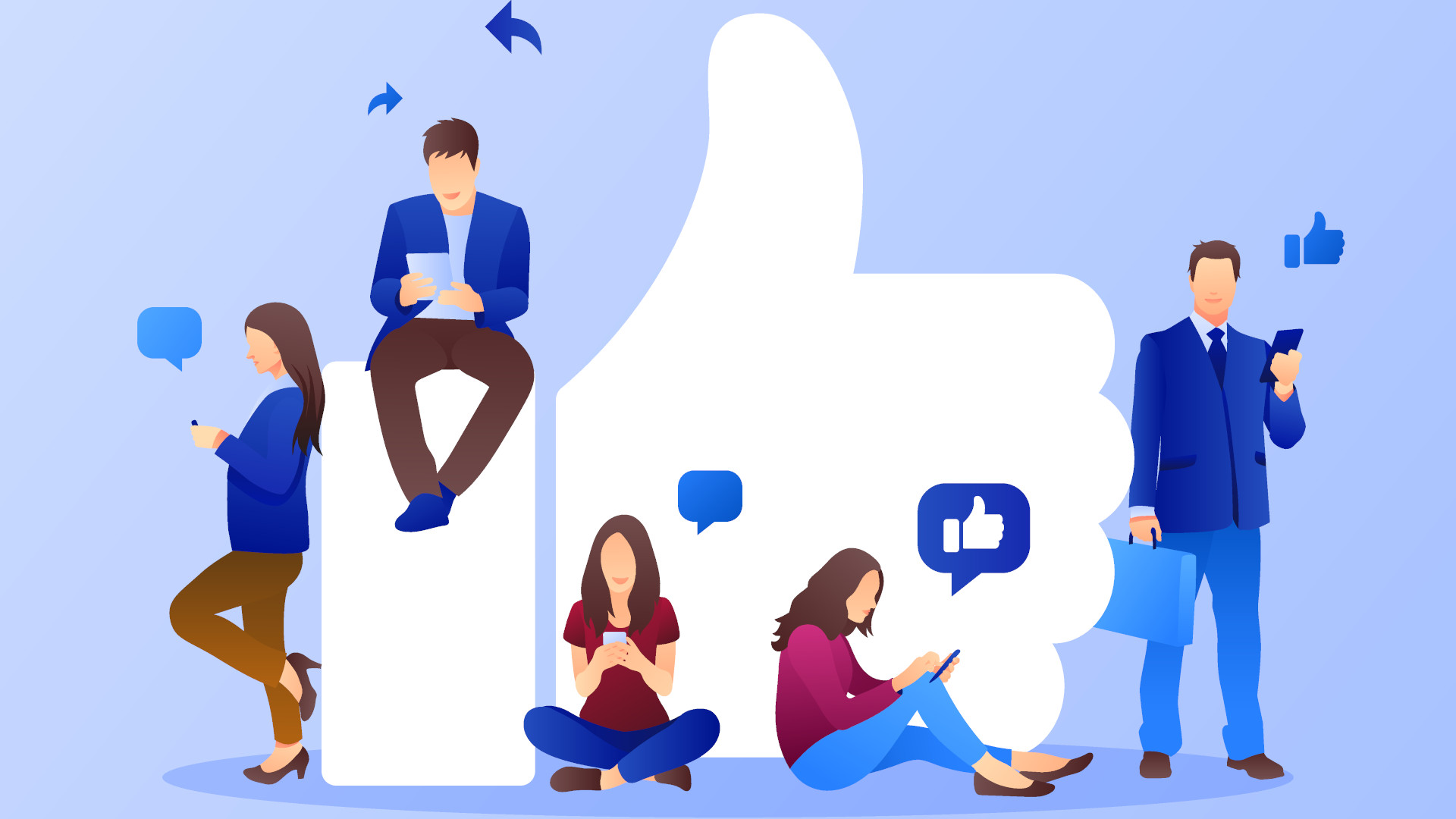
Adapt to survive
Despite the many valid concerns, it’s a reality that social media is here to stay. Hemendinger highlights legislation under consideration by policymakers in the US to regulate or restrict social media, as well as misinformation online, but it may well be the case that some younger people are one step ahead already.
Hemendinger considers that “perhaps because the demographic was 18-29, this demographic is better able to discern what is helpful versus unhelpful social media. As a result, they can curate their feeds to be less toxic and more aligned with what makes them feel good.”
Whether younger people just haven’t yet recognized or experienced the ways in which social media may be damaging to their mental health or they’ve genuinely circumnavigated some of its effects to find greater benefits, social media remains as divisive as it’s ever been.
For now, it’s a waiting game as we watch how a blend of regulatory action, user behavior, and new moderation tools might shape the next generation of social media platforms; or, indeed, if we collectively decide it’s better to head outside and touch grass.







